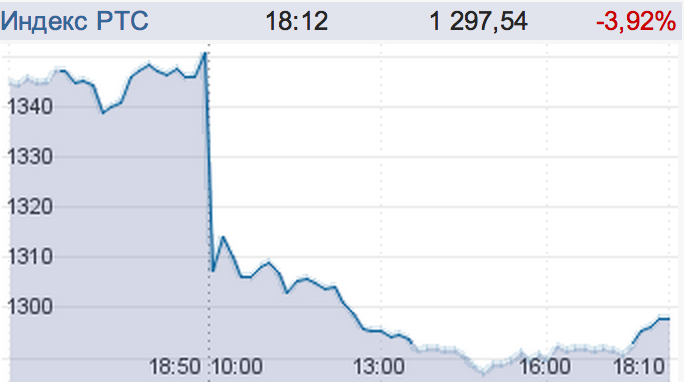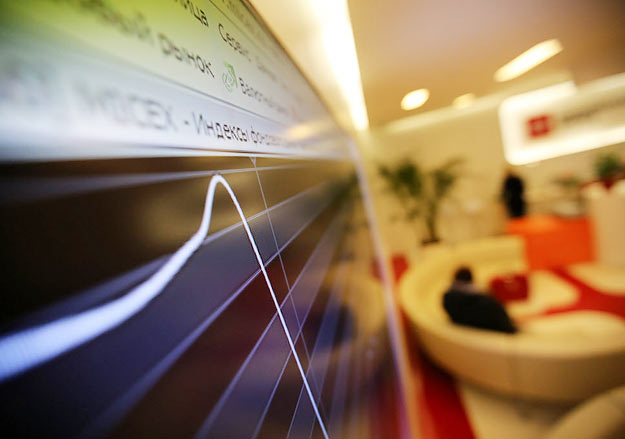How Economic News Affects the Stock Market

Many have heard that the stock market (and more broadly, the financial system of any country) often reacts to external events by increasing or falling quotes. Messages that this or that news “brought down the market” appear in the media with enviable regularity. Another such incident occurred today, when after the announcement of the next sanctions by the United States against Russian companies and officials, the stock market and the national currency of Russia declined. Leaving aside the political component of this issue, it seemed interesting to us, however, to take a closer look at the mechanics of the impact of news on the stock market in this specific example.
What's the news
According to media reports, US sectoral sanctions have been imposed on Novatek, Rosneft, Vnesheconombank and Gazprombank. As a result of this action, the assets of the listed companies will not be frozen, but American organizations and citizens are now prohibited from investing in new shares and bonds of these enterprises.
A number of companies of the military-industrial complex of the Russian Federation also fell under restrictions, including Almaz-Antey Corporation and Kalashnikov Concern, Izhmash NPO, Bazalt NPO, Uralvagonzavod, Radioelectronic Technologies Concern OJSC, and Concern " Constellation ”, NPO Mashinostroeniya, OJSC“ Design Bureau of Instrument Engineering ”.
Market reaction
After the opening of trading on domestic and foreign exchanges, quotes of Rosneft and Novatek fell off - by 14.59 Moscow time, the shares of Rosneft fell 4.46% to 233 rubles. for a security. At the opening, they fell by 5.4%. Shares of Novatek fell 8.87% to 364.6 rubles. The cost of Novatek depositary receipts fell 11.27% to $ 103.9 per share, while Rosneft receipts fell 5.58% to $ 6.67 per one listing on the London Stock Exchange.
The dollar exchange rate increased by 60.65 kopecks to 14.43 Moscow time. to 34.99 rubles, and during the bidding even exceeded the mark of 35 rubles. The euro rose 83.1 kopecks to 47.34 rubles. The RTS index fell by 4.71% to 1286.97 points by January 15, Moscow time. MICEX fell by 3.05% to 1,430 points.

In a conversation with the Vedomosti, analysts of financial organizations noted the negative impact of such news on the stock market. In particular, one of them noted:
[Negative news] is a long-playing topic that will have a negative impact on Russian companies (credit will become more expensive) and on the Russian economy as a whole through increased credit risks and, accordingly, increased borrowing costs.
Why
The editorial board of IT Invest asked the analyst of the company Vasily Oleinik to explain why today's news had such an impact on quotes, and whether it was possible to derive any benefit from this:
Today's collapse is the worst fall since March 3. From mild sanctions that affected only individuals, the United States moved on to tougher economic sanctions that affect the activities of individual companies and entire sectors of the economy. The so-called new “sectoral” sanctions can significantly worsen the situation in the Russian economy, which will immediately affect the stock market. Investors pessimism is explained by the fact that the first stage of such restrictions will hit organizations that fall under them - all of them have lost the American capital borrowing market and will not be able to borrow money in the United States and will be forced to do so in other countries.
As a result, due to a lack of capital, a number of medium-term and long-term projects can be frozen, and the work of government agencies such as VEB and Gazprombank can become significantly more complicated, and the state is unlikely to significantly help here. Liquidity problems are already starting to put pressure on many Russian companies and the Central Bank cannot help everyone. For several months now, Russian credit organizations have been raising money even for any non-marketable assets, thereby worsening the balance sheet of the Central Bank.
As a result, Russian companies will have no choice but to seek new capital for long-term projects, for example, in the Asian region, but they are unlikely to succeed. This situation is extremely deplorable and it is possible that the United States will not stop there. The next blows to the Russian economy may be stronger, the only question is whether Europe will support them, since Europe is the main trading partner of Russia. Hope is only on common sense and the boomerang effect, because if the EU makes Russia worse, then it will make worse for itself.
The package of economic sanctions introduced today is really nonsense. For the first time in history, they were introduced not through the UN Security Council, but through supranational organizations of the European Union, government organizations of the USA, Germany, Canada, Australia, etc. The reason for this is the senselessness of sanctions against Russia in the UN Security Council, because the country is a member of it and has the right to veto.
It was almost impossible to play such an event and make money on it, since the Russian market discounted most of the negative at the opening and spent the whole day near the minimum marks. Earnings on this news could only those who went to the night in short positions, but it is very difficult to predict the release of such news, although they are often expected.
In future posts, we will examine in more detail, using practical examples, the influence of news (both economic and political) on the financial system and the stock market, in particular. Not all news has a short-term impact, as in the case considered above - it is important to understand what features have news of a long-term and short-term “type” in order to correctly determine their possible financial consequences.
Related posts:
